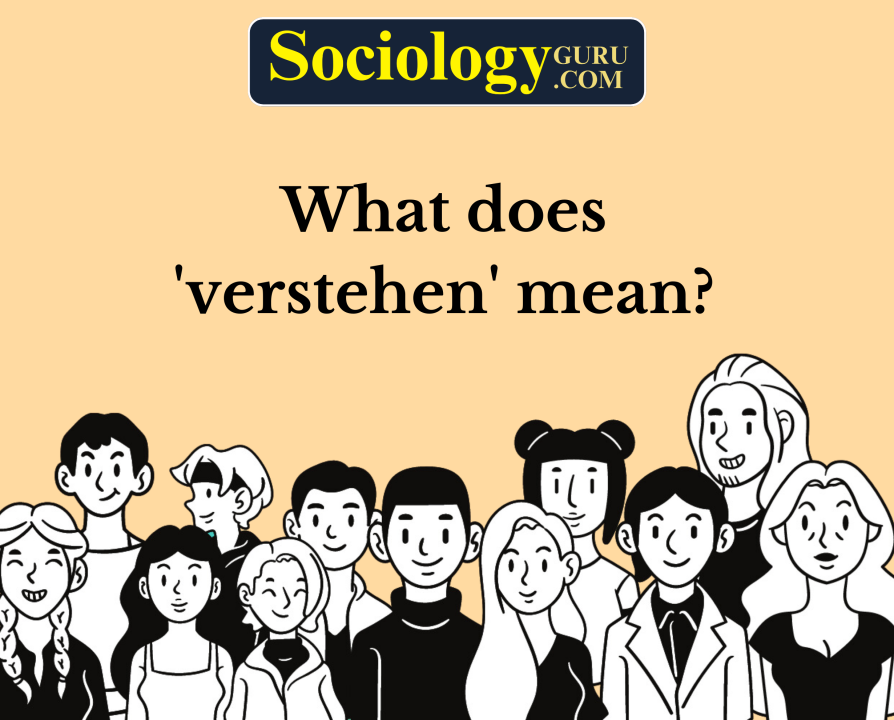
What does ‘Verstehen’ mean? | Sociology for CUET by Vikash Ranjan | Sociology Guru
Question: What does ‘verstehen’ mean?
Interpretative sociology
Organisational sociology
Understanding
Both (a) and (c)
Answer: (4)
The correct answer to the MA CUET exam question is (d) Both (a) and (c). The term ‘verstehen’ is intricately linked to interpretive sociology, and it essentially means “to understand.” Max Weber, a key figure in the development of interpretive sociology, introduced and popularized the concept of ‘verstehen’ as a fundamental methodological principle.
Interpretive sociology, rooted in the idea of ‘verstehen,’ represents an approach that seeks to understand social phenomena by delving into the subjective meanings and interpretations that individuals ascribe to their experiences. It involves gaining a meaningful understanding of the social world from the standpoint of those who are actively engaged in it. To interpret social phenomena is to immerse oneself in the perspectives of individuals, attempting to comprehend the world as they see and experience it.
The German word ‘verstehen’ captures the essence of interpretive sociology, emphasizing the need for researchers to empathize with and appreciate the subjective meanings that individuals attribute to their beliefs, values, actions, behaviors, and social relationships. This approach contrasts with more objective and detached forms of sociological inquiry, as it acknowledges the importance of grasping the lived experiences and perspectives of the actors involved in social situations.
Max Weber, a Prussian sociologist, is credited with the development and popularization of interpretive sociology. Weber recognized the limitations of purely objective and positivist approaches to sociology, which often overlooked the intricate nuances of human behavior and the richness of subjective experiences. Instead, he advocated for an interpretive understanding that goes beyond surface-level observations and statistical analyses.
Weber’s concept of ‘verstehen’ is evident in his emphasis on the importance of empathy and imagination in sociological research. To truly understand social actions and interactions, researchers must go beyond external observations and endeavor to comprehend the meanings that individuals attribute to their behavior. This involves adopting a perspective that recognizes the diversity of human experiences and acknowledges the cultural, historical, and contextual factors that shape these experiences.
Interpretive sociology, as guided by ‘verstehen,’ is concerned with uncovering the symbolic meanings embedded in social phenomena. This approach acknowledges that individuals construct their social reality based on shared symbols, language, and cultural norms. Researchers practicing interpretive sociology strive to uncover these meanings by engaging with the perspectives of those being studied.
Georg Simmel, a contemporary of Max Weber, is also acknowledged as a major contributor to interpretive sociology. Simmel’s work delves into the complexities of social interactions and the intricate patterns that emerge from individual relationships. Like Weber, Simmel recognized the importance of understanding the subjective meanings that individuals attach to their actions and interactions.
To practice interpretive sociology is to adopt a qualitative and holistic research approach. Researchers engage in in-depth interviews, participant observation, and analysis of symbolic interactions to uncover the layers of meaning within a social context. The goal is not only to describe observable behaviors but also to interpret the underlying motivations, beliefs, and values that inform those behaviors.
The conjunction “Both (a) and (c)” in the answer acknowledges that ‘verstehen’ aligns with interpretative sociology (option a) and emphasizes the essence of understanding (option c). Interpretive sociology, with ‘verstehen’ at its core, encourages researchers to go beyond mere observation and statistical analysis. Instead, it prompts them to engage with the subjective experiences of individuals, acknowledging the diversity of perspectives that shape social reality.
In conclusion, the term ‘verstehen’ is central to interpretive sociology, a theoretical approach developed and popularized by Max Weber. This approach emphasizes the importance of understanding social phenomena from the perspective of those actively involved. Georg Simmel, another influential sociologist, also contributed to the development of interpretive sociology. ‘Verstehen’ encapsulates the essence of this approach, signifying a commitment to meaningful understanding, empathy, and an appreciation for the subjective meanings that individuals attribute to their social experiences. The integration of ‘verstehen’ into interpretive sociology enriches sociological inquiry by recognizing the complexity and diversity inherent in human social interactions.